It has begun.
I went out to check Oakley and her new calf a couple of days ago and noticed a smattering of small flies already sticking to her back and flanks.
(By the way, WE HAVE A NEW CALF!)
But back to my story…
Animals make manure, and manure attracts flies. LOTS of flies. Our city friends are always a bit shocked to see the sticky fly strips hanging from the ceiling in my kitchen when they visit (oh-so-classy, but necessary….), or how any exposed plate of food is instantly dive-bombed by dozens of flies during a summer BBQ.
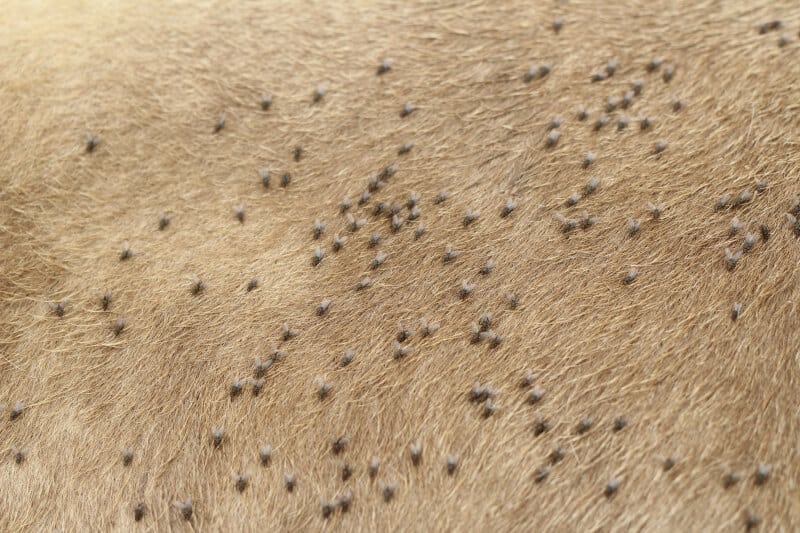
It’s truly an all-out war here in the summertime.
The truth of the matter is that we’ll never completely eradicate flies from our homestead, and that’s not my goal anyway.
However, over the years I’ve developed a battle plan to help control and reduce the massive fly population, and I think it’s working. It’s not perfect, by any means, but it makes fly season slightly more bearable. Here are the details of my two-pronged approach:
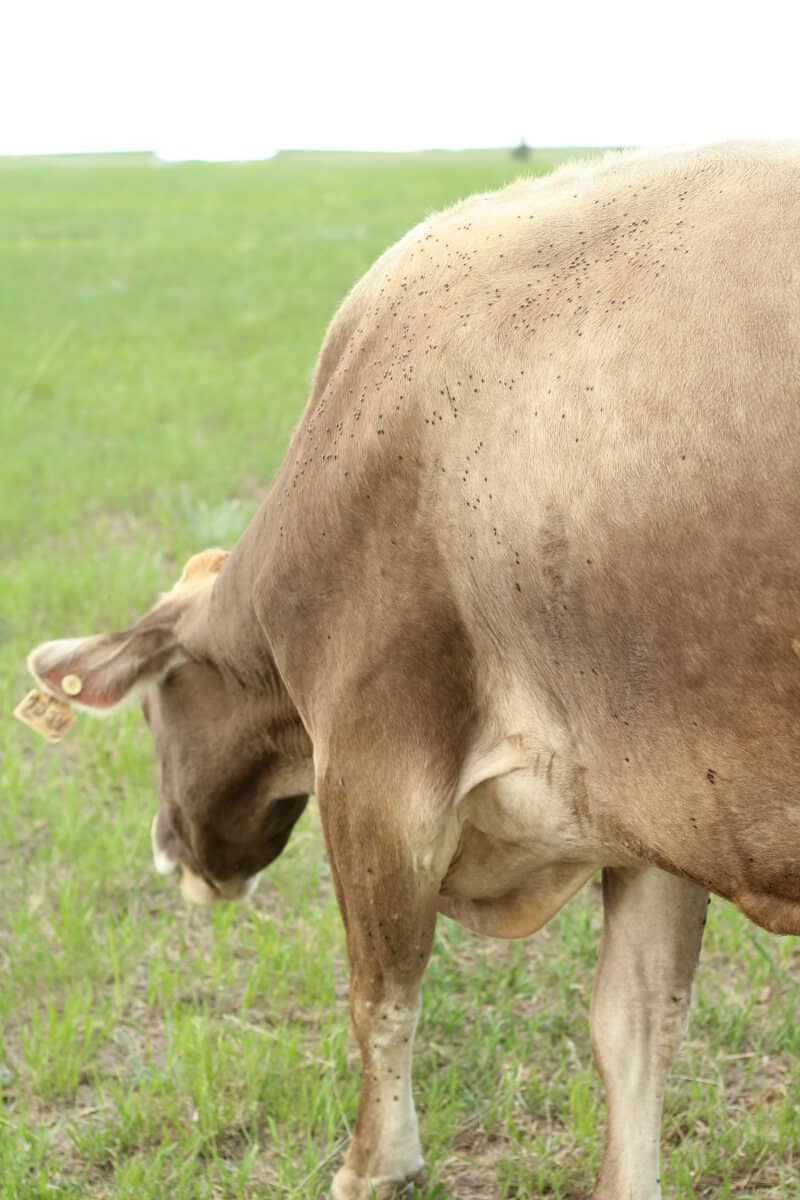
Natural Strategies for Farm Fly Control
(This post contains affiliate links)
Farm Fly Control Part 1 – Reduce Fly Larvae
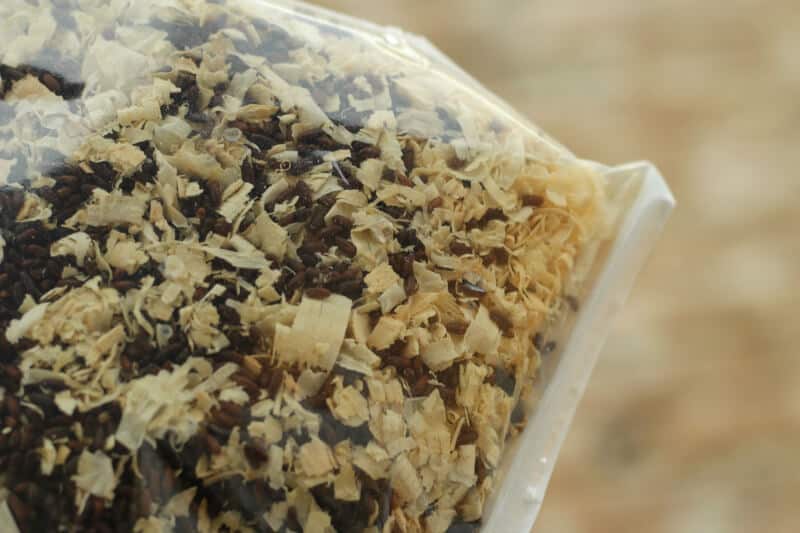
1. Fly Predators/Parasitic Flies
This is my second year using fly predators, and I’m excited to see the results now that we have the first year under our belts. Basically, you’re fighting the bad bugs (flies) with good bugs (predators). I like this concept, as it controls flies BEFORE they ever hatch, and does not require any toxic chemicals or sprays.
What are Fly Predators?
Fly predators, or parasitic wasps, are natural enemies of flies (but they don’t bother people or animals). They lay their eggs in fly pupae, thereby eliminating flies before they ever have a chance to hatch. According to the Organic Agriculture Center of Canada, “…parasitic wasps can contribute to 50% fewer flies when used in combination with adequate manure removal.”
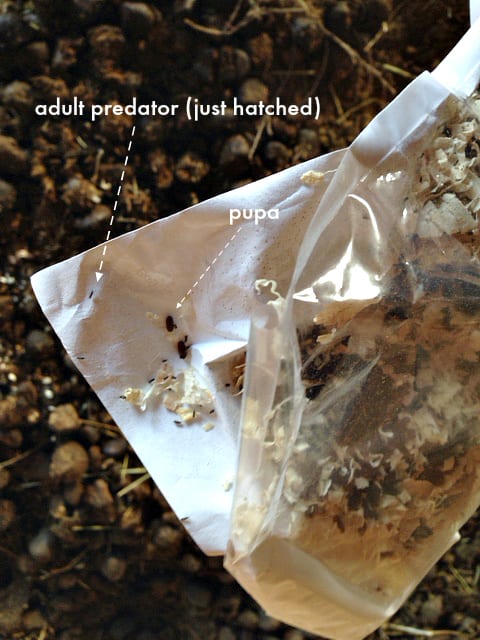
How do Fly Predators Work?
After you place your order, you’ll get a lovely little baggie of predator pupae (cocoon things) in the mail. Let the bag sit for a few days until the tiny predators begin to hatch, then deposit them in key spots (aka manure piles) around your barnyard.
The adult predators feast on the pupa of the annoying flies, and you get a fly relief program that doesn’t require pesticides. One caveat: chickens like to eat the predator pupae, so try to deposit them in an area where your chickens don’t have easy access.
If you want to try predators, you’ll likely want to order them starting NOW, and then add several more shipments throughout the rest of the summer. I just released my first batch of the year this week.
Where do I Get Fly Predators?
I have been getting mine from Spalding Labs. They have this sweet calculator tool that helps you figure out how many fly predators you need (according to how many animals you have), and they also have a lot of helpful info on their website which I’ve referenced numerous times as I’ve introduced fly predators to my homestead.
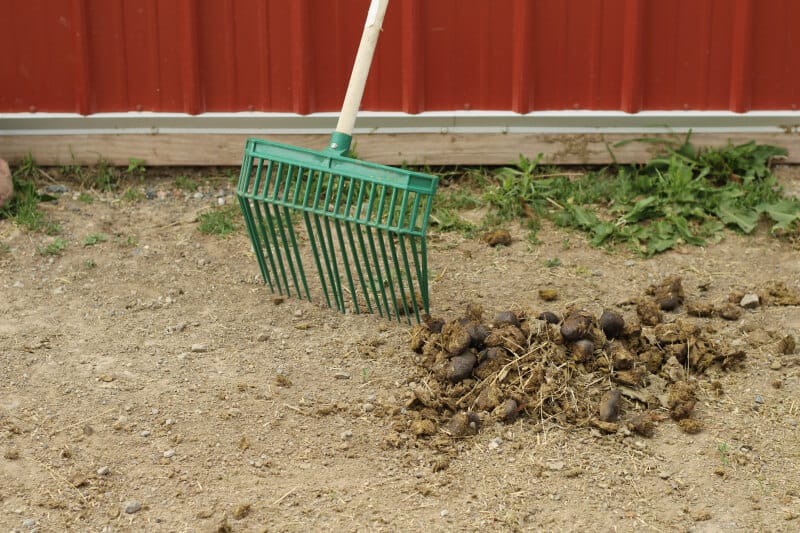
2. Manure Management
It’s a simple equation:
Less manure = fewer flies.
Manure is simply a fact of life when you have animals, so manure management is key. (Hey, that’d be a super book title, wouldn’t it? “Manage Your Manure”…)
Flies adore poop, especially the wet stuff, so do whatever you possibly can to remove it or reduce it in your barnyard. For us, this includes:
- Regular barn/pen cleaning (although sometimes I’m better about this than others…)
- Mounding the manure in a large enough pile (far away from the barn) to allow it to heat up. The heat makes it a less hospitable spot to lay eggs, and it also produces beautiful compost.
- Spreading manure in a thin layer in our pasture (using a manure spreader). This also helps to fertilize the grass.
- Dragging the pasture (with a tractor/drag) to break up manure piles, dry them out, and further reduce places for flies to lay eggs.
Farm Fly Control Part Two: Capture/Repel Adult Flies
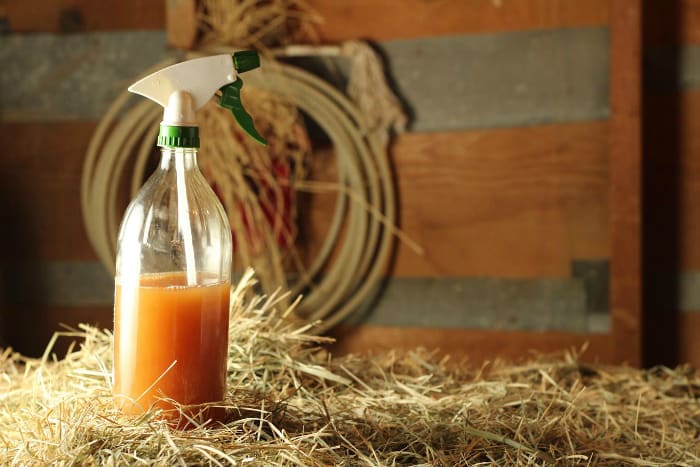
1. Homemade Fly Sprays
When July rolls around, all the critters start to look just plain miserable as they fight the flying masses… This is when I break out my DIY fly sprays and use them liberally.
I generally spray down my milk cow when I milk her each morning and will grab the horses and spray them if I see them hanging out in the barn during the day.
I’ve tried a number of DIY recipes over the years, but this one is my favorite homemade fly spray recipe.
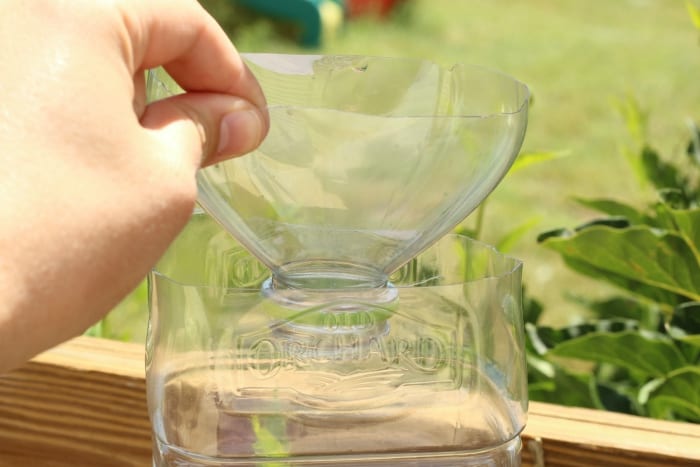
2. Fly Traps & Sticky Tape
Last, but not least, fly traps and those lovely golden sticky tape strips are surprisingly effective.
You can easily make your own fly trap, or they are fairly reasonably priced at the local feed store. I fill mine with water and a bit of sweet, slightly rotten fruit (like banana or watermelon)
Fly strips aren’t super glamorous, but they totally work, you can probably find them at your local feed store. Hang them from the ceiling and change them often– they’ll fill up fast…
3. Plant Farm Fly Control Plants & Herbs
There are plants and herbs that can be planted around manure dump sights or entrances of barns and chicken coops (Here are an additional 6 Strategies for Fly Control in the Chicken Coop)that naturally repel adult flies. If you can’t plant them directly in the ground then plant them in containers and place them around different areas.
Fly repelling plants and herbs:
- Basil
- Marigold
- Lavender
- Bay Leaves
- Catnip
Note: Not only do these plants help repel flies they also add a bit of color and can double as culinary herbs.
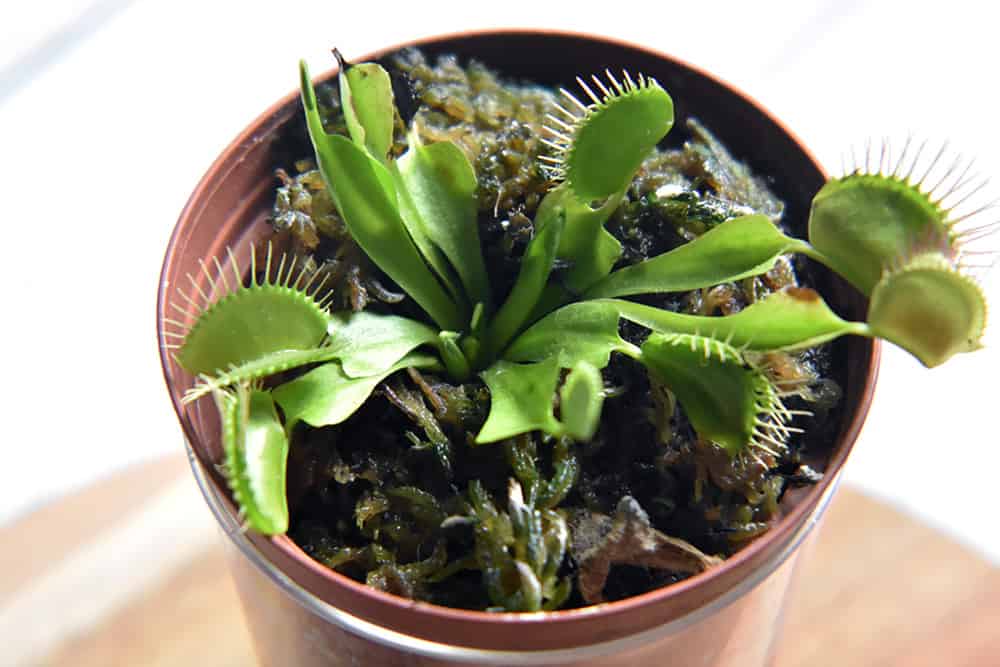
4. Use a Venus Fly Trap or Two
This natural way to control flies isn’t exactly conventional, but it does seem to work if these plants are placed on windowsills. You can plant these plants outdoors and they do well in warmer climates but if you live in northern climates you will need to take extra precautions to prevent your plants from freezing.
You can learn more about how to care for Venus Fly Traps Here.
These are far from a quick-fix solution, but that’s my farm fly control battle plan in a nutshell–hopefully, it can help you develop your own as well. May the odds be ever in your favor as you battle the bugs this year. 😉
More Homestead Management Articles
- Managing Livestock in the Winter
- How to Go on Vacation When You Have a Homestead
- Fly Control in the Chicken Coop
- 30 Essential Oil Hacks for Homesteading
Listen to the Old Fashioned On Purpose podcast episode #9 on this topic HERE.
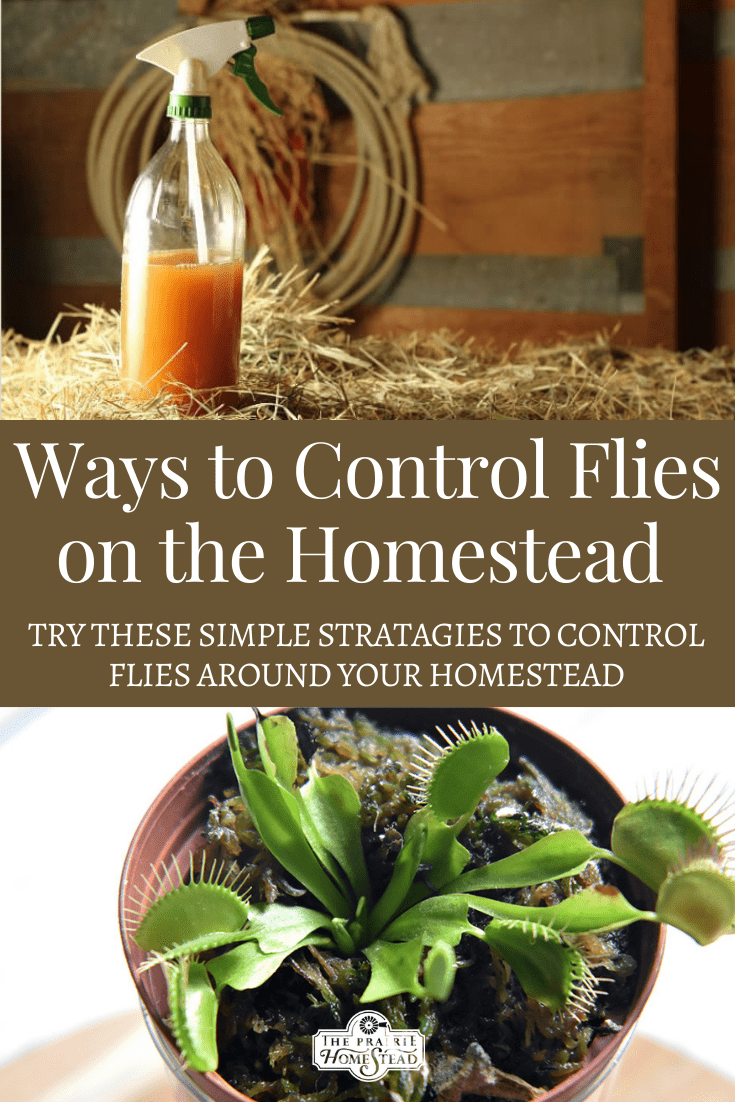



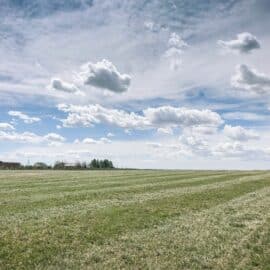

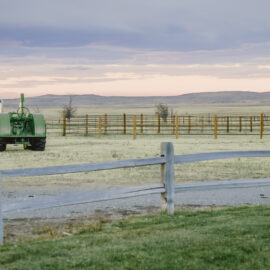
My corn has more flies than my chicken coop-anyone know why flies love to fly around corn? Is there something wrong with my corn?
Using the fly predators for the first time and I really do think they are making a difference. Also I have made several of you fly traps with 2 liter bottles and they are filling up! It’s strangely rewarding to see it fill, lol.
I am going to try some of these. We have had so much rain and warm weather this spring that the flies are EVERYWHERE! Thanks.
I hope they help Shasta!
We have DUNG BEATLES in Australia that eat the manure and take it down into the soil. This keeps our farm with no flies. It’s a wonder you don’t have them over there.
Two words. Fire ants. They are the apex ground insect in Texas. They kill everything
(sorry for necro-ing this old comments section) The Australian government (CSIRO) introduced dung beetles to mitigate fly populations. This project is considered a large success as mature dung beetles drink the fluid drying out the cowpad (an identified key factor in fly breeding) and bury portions underground for their larvae.
We have fire ants (introduced pest here, although not endemic yet) I would it is possible they do not effect them much as adults only colonize fresh manure then burrow up to some 30cm (aerating and fertilizing your soil). Limitations: Certain parasite treatments for cattle kill them outright (safe options are known) and there are different species only active in different seasons.
My extended family has a dairy and they used to have horrible fly issues. My Aunt got runner ducks and their fly population went down a lot. It might be something else to add to your preventative measures.
Love that idea! We have a couple ducks, but i imagine getting a few more would probably be even better.
I dont suggest the ducks if you have a above ground pool in your pasture next to the house like mine. We had some and they would sit on the side and just poop in it. When we drained the pool there was 4 inches of duck dodo at the bottom. Completely ruined a brand new shop vac! Lol
I love the fly predator idea. We have lots of heat in the summer which brings lots of flies!
Another defense – fill Freezer (for the strength) zip-loc (or any clear) qt. or gal. bags ’bout half full and hang it where you don’t want flies – it works! One theory is that the light refracting from the water looks like a big bug eye and the flies vacate the premis to avoid being eaten – whatever, it works. I didn’t believe until we taped/hung 4/5 from the roof of our competition BBQ rig. The final test – preparing seafood gumbo from scratch, outside in a Houston summer – normally you are the best friend of every fly in the county – no flies!
Yes– I’ve tried that in the past as well– it works!
Do you ever have a problem with too many parasitic wasps? If so, how do you deal with that? Thanks. Also, I sprinkle diatomaceous earth around the chicken pen to deal with flies in there.
No, I’ve never had a problem with that. 🙂
We did fly predictors for 2 years and they didn’t work. I do have chickens and they are always out digging in the manure etc. it’s hard to keep them cooped up when it’s this hot because they love to go in where the goats are. Any Suggestions? I do use the sticky fly traps and yes they do work. I have a lot of them in the house. I even have a pretty one hanging from the light over my dining room table, it seems every time we sit down to eat the flies show up.
Try DE powder on your farm and give it orally to the animals to help control the fly problem.
Yep, we use a lot of DE.
I really liked your tips on manure management. I totally agree that flies like poop, so making sure you try and get rid of it as much as possible is a huge deal. Being able to make compost is also a benefit. These were all some really good tips, but I really appreciated the tips on manure. Thanks for sharing!
I don’t know the specifics about your situation, but I’ve recently heard about the connection between wormers and dung beetles (etal), and consequent “plagues” of flies. In other words, when folks treat their animals with wormer, the chemical has a detrimental effect on the dung beetles and other such critters and microbes that typically break down manure in an efficient manner; this disruption in the food chain results in an abundance of flies. I’m sure there are plenty of studies and articles about the subject out there… My own quick search for “dewormer + flies” yielded a useful discussion and links in the permaculture forum: https://permies.com/t/13747/cattle/critters/Deworming-Fly-Control-Cattle-Beef.
Thanks for the this! I’ll check it out.
Be cautious WITH DE. I sprinkled some in the goat feeder and the Boer buck took a big sniff. Next thing I knew he was have a serious nose bleed. Those small crustacions that DE consists of sliced the thin membrane in his nostrils. He was snorting droplets of blood all over for an hour. Not life threatening, but unpleasant.
Yes, definitely having humans or animals breathing in DE.
Do ducks work?
We have a flock of Muscovy ducks this year and the flies have finally become a non-issue. The chickens scratch up most of the larvae and the ducks get the adults before they have a chance to lay anything. The goats happily let both flocks range in their yard and stalls without issues.
Was just going to say the same thing. Got Muscovys last year and not only did the fly population go down, but manure cleanup became kind of a non-issue. Had a hard time gathering as much as I wanted/needed for my compost and making the cob for a strawbale building.
Muscovies and a pair of Guineas have dramatically decreased my pest problems from ticks to flies to mosquitoes.
Ducks and chickens ranging behind our pigs and goats has helped dramatically! We rotate our critters daily and there set up right next to the house during hot weather so i can keep a good eye on them and the ducks and chickens have helped with the flys alot!
The Muscovy Ducks do not quack so are great if you live in the suburbs.
Is it too late to buy predators? Our grandchildren have 3 steers in our field in a fenced are near a shed. And the flies are making a mess of the vinyl deck railing and vinyl windows of the new house we are building. Too much invested in the new house to ruin the looks……the fly poop stains. Any ideas for our situation ?
Water in baggies, hung in doorways/windows, etc, help LOTS! Fly predators-amazing! If they don’t help, you’re doing it wrong Pine Sol, cedar shavings, cedar/evergreen branches, strategically placed, human grade DE, (kills flynlredators, so careful!) Essential oil sprays: mint, lavender, rosemary, TOnS of recipes! Coffee grounds, geraniums, lemons with cloves stuck in them, CLEAN buckets, horses. Flies love “stink & sweat”. Wash stuff!! DRY OUT your poo, mildewed round bales, muddy water zones MOVE trough every few days!
Where is the recipe for the homemade fly spray? I am not seeing it.
I found it, sorry.
We have DUNG BEATLES in Australia that eat the manure and take it down into the soil. This keeps our farm with no flies. It’s a wonder you don’t have them over there.
That’s very useful. I know how to get rid of with various home pests, but flies are the most difficult to deal with. I’m not a farmer myself, but my dad is. I’m going to show your blog to him, I think he will like it. Thanks!
I dont suggest the ducks if you have a above ground pool in your pasture next to the house like mine. We had some and they would sit on the side and just poop in it. When we drained the pool there was 4 inches of duck dodo at the bottom. Completely ruined a brand new shop vac! Lol
What about those gnat things that always hang around dogs face and bum? What can I use for that?
Have you heard of intensive rotational grazing. If you can keep the cattle moving to fresh grass every day the flies stay behind on the cow pie and not on the cows. Then three days or so after the cattle have moved on let the chickens in and they will eat the larvae before they can become adults. Take a look at Joe Salatin or Gabe Brown’s videos no flies on their herds. Or Holistic Management for a larger ecosystem strategy: https://holisticmanagement.org/
The other day you posted how you make yogurt in quart size canning jars. I had to go do something during the video & when I got back, the video had finished & when I tried to re-start it, I accidentally deleted it & other posts had come onto my page so now I can’t find it. Is there somewhere here on your blog that I can click onto it? Thank you!